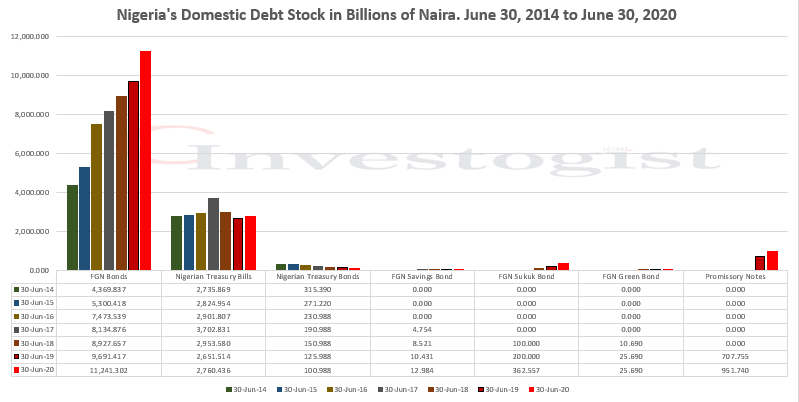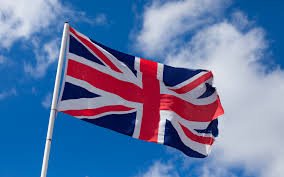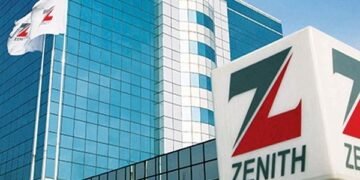The Federal Government of Nigeria under the administration of M. Buhari had made external loans the bedrock of the nation’s borrowings.The country however continued borrowing in the domestic market, albeit at a slower pace. Investogist had reported earlier in the week that Nigeria’s External Debt grew by 236% in 6 years.
We analysed the debt stock data released by the Debt Management Office, and found that the domestic debt stock increased slower than the external debts, but still managed increase by 108% over the past 6 years.
- Read also; Afreximbank disburses US$200 million to Zenith Bank Plc
- Credit to private sectors by banks rose to N18.82 trillion in Q2 2020
FGN Bonds which constituted 73% of all domestic debt stock as at 30 June, 2020, has increased by 157.25% from its 30 June, 2014 figures. Nigerian Treasury Bills which constitute 18% of the domestic debt stock as at 30 June, 2020, decreased by 67.98% from what it was on 30 June, 2014.
The yield on the Nigerian Treasury Bills has been abysmal in recent times, currently below 4% per annum.
The bar chart below shows the debt stock from each debt instrument over the 6 years in review.

About the debt instruments
FGN Bonds are debt securities (liabilities) of the Federal Government of Nigeria (FGN) issued by the Debt Management Office (DMO) for and on behalf of the Federal Government. The FGN has an obligation to pay the bondholder the principal and agreed interest as and when due. When you buy FGN Bonds, you are lending to the FGN for a specified period of time.
The FGN Bonds are considered as the safest of all investments in domestic debt market because it is backed by the ‘full faith and credit’ of the Federal Government, and as such it is classified as a risk free debt instrument. They have no default risk, meaning that it is absolutely certain your interest and principal will be paid as and when due. The interest income earned from the securities are tax exempt.
Nigerian Treasury Bills: The Nigeria Treasury bills are government-guaranteed debt instruments issued by the CBN on behalf of the Nigerian government. It is a short-term securities issued at a discount for a tenor ranging from 91 to 364 days.
The profit from the investment is the income received is the difference between the purchase price and the amount received at maturity or before the sale.
FGN Sukuk Bond: Sukuk is an investment certificate that represents the ownership interest of the holder in an asset or pool of assets The certificate entitles the holder to receive income from the use of the assets.
What it implies is that the issuer of the Sukuk bond (FG) sells an investor group a certificate, and then uses the proceeds of the bond to purchase an asset (In Nigeria case, road construction & rehabilitation) of which the investor group has partial ownership. The issuer (FG) must also make a contractual promise to buy back the bond at a future date.
FGN Green Bond: Green Bonds are bonds that are used to raise capital specifically for environmentally friendly
projects i.e. projects that are climate friendly and leave little or no adverse effect on the environment.
Green Bonds provide opportunities for investment in the projects that deliver sustainable development. These projects are also referred to as “Qualifying or Eligible Green Projects”. Such projects produce environmental and economic benefits and also help change the economy away from fossil fuels.
Promissory Notes: A Promissory Note is an unconditional written promise by one party (the maker) to pay money to another party (the payee or the bearer) on a specific date, or on demand. Promissory Notes are commonly used in business transactions involving a debtor-creditor relationship. A typical scenario is where one party lends money to another party, whereupon the Promissory Note is used to document the promise by the latter to repay the loan. A Promissory Note is also useful where a party purchases goods on credit from its suppliers and promises to pay at a later date.
The Federal Executive Council, FEC, approved the establishment of the Promissory Note Program to settle inherited local debts and contractual obligations due to various categories of creditors, including oil marketers in July 2017.
Written by;
Nnamdi M.


























































